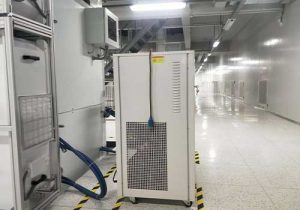liquid cooling temperature
Understanding Liquid Cooling Temperature Management
Liquid cooling systems have become indispensable in managing the heat generated by high-performance computing equipment. As data centers continue to densify with more powerful processors and GPUs, traditional air cooling methods are reaching their limits. Liquid cooling offers a viable solution by directly managing the heat at the source, ensuring optimal operating temperatures and extending the life of critical components.

How Liquid Cooling Works
Liquid cooling systems function by circulating a heat transfer fluid through a closed loop that comes into direct contact with heat-generating components. The fluid absorbs heat and transfers it away from the equipment, maintaining a safe operating temperature. This method can be further divided into direct liquid cooling, where the fluid is in direct contact with the components, and immersion cooling, where components are submerged in a bath of coolant.
Components of a Liquid Cooling System
The core components of a liquid cooling system include:
Cold Plates: These are designed to absorb heat directly from components like CPUs and GPUs, transferring it to the coolant.
Pumps: Responsible for circulating the coolant through the system.
Heat Exchangers: Used to dissipate the heat absorbed by the coolant into the environment.

Coolant: The fluid that circulates through the system, often a specialized liquid with high heat capacity and low electrical conductivity.
Reservoirs and Tubing: Hold the coolant and transport it around the system.
Advantages of Liquid Cooling
Liquid cooling offers several advantages over traditional air cooling:
Higher Heat Transfer Efficiency: Liquids can absorb and carry more heat than air, making them more effective in high-density environments.
Lower Operating Temperatures: Components can operate at lower temperatures, reducing the risk of thermal throttling and extending lifespan.
Reduced Noise: Liquid cooling systems can operate silently, unlike air cooling systems that rely on noisy fans.
Energy Efficiency: By maintaining lower temperatures, liquid cooling can reduce the energy consumption of cooling fans and improve the overall efficiency of the data center.
Applications of Liquid Cooling
Liquid cooling systems are used in a variety of applications where heat management is critical:
Data Centers: Managing heat in server rooms and high-performance computing clusters.
Industrial Processes: Cooling equipment in manufacturing and processing facilities.

Electronic Devices: Ensuring reliable operation of high-power electronic components in consumer and professional devices.
Maintenance and Safety
Proper maintenance is crucial for the efficient operation of liquid cooling systems. This includes regular inspection of the coolant for contamination, checking for leaks, and ensuring that all components are functioning correctly. Safety features such as leak detection and prevention mechanisms are also essential to prevent damage to equipment and ensure the safety of personnel.
Conclusion
Liquid cooling systems are a critical technology for managing heat in high-performance computing environments. As the density and power demands of data centers continue to grow, liquid cooling offers a scalable and efficient solution. With ongoing advancements in coolants, heat exchangers, and system design, liquid cooling is set to play an increasingly important role in the thermal management of next-generation computing equipment.
Related recommendations
Advantages of Air Cooled Chillers
1246Advantages of Air Cooled Chillers Configuration of air-cooled chillerAccording to the compressor, the air-cooled chiller can be divided into an air-cooled scroll chiller and an air-cooled sc...
View detailsPrecautions for the refrigeration pipeline of the chiller
1432Precautions for the refrigeration pipeline of the chiller The diameter of the copper pipe should be selected in strict accordance with the suction and discharge valve interface of the compre...
View details30 ton water chiller
75930 Ton Water Chiller: Medium-Scale Cooling Solutions for Diverse Applications A 30-ton water chiller is an essential component in the HVAC systems of medium to large-sized buildings, offering a...
View detailsportable industrial chillers
765Portable Industrial Chillers: On-the-Go Temperature Control for Industrial Processes Portable industrial chillers, also known as portable cooling units, are specialized refrigeration systems de...
View details
 LNEYA Chiller
LNEYA Chiller







HelloPlease log in